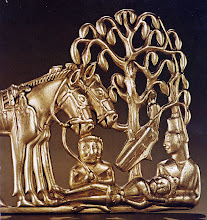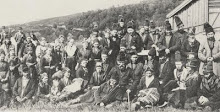This excerpt from the New York Times story by Barry Bearak about the Bushmen's plight brings home the harsh reality of the Bushmen today:
"However humble their lives, the Bushmen of Botswana’s central Kalahari are well known to the world, the subject of books, films and anthropological studies. They are frequently portrayed — or, as many say, romanticized — as classic hunter-gatherers, a living link to humankind’s collective beginnings.
But for decades, they have been entrenched in a tug of war over their fate that has often gone unnoticed, a saga now replete with edicts and court cases, with alcohol abuse and sundered families, with an aboriginal people despairing about the uncertainty of their future. Since the 1980s, Botswana, a landlocked nation of two million people, has both coaxed and hounded the Bushmen to leave the game reserve, intending to restrict the area to what its name implies, a wildlife refuge empty of human residents. Withholding water is one tactic, and in July a High Court ruled that the government had every right to deny use of that modern oasis, the borehole. An appeal was filed in September.
These days, only a few hundred Bushmen live within the reserve, and a few, like Mr. Taoxaga, still survive largely through their inherited knowledge, the hunters pursuing antelope and spring hares, the gatherers collecting tubers and wild melons, tapping into the water concealed in buried plants.
But most of the Bushmen have moved to dreary resettlement areas on the outskirts, where they wait in line for water, wait on benches at the clinic, wait around for something to do, wait for the taverns to open so they can douse their troubles with sorghum beer. Once among the most self-sufficient people on earth, many of them now live on the dole, waiting for handouts.
“If there was only some magic to free me into the past, that’s where I would go,” said Pihelo Phetlhadipuo, an elderly Bushman living in a resettlement area called Kaudwane. “I once was a free man, and now I am not.”

Joao Silva for The New York Times
A resident of New Xade, an area outside the Central Kalahari Game Reserve where many Bushmen have been resettled.
For Some Bushmen, a Homeland Worth the Fight
By BARRY BEARAK
Published: November 4, 2010
Read more of this story here:




